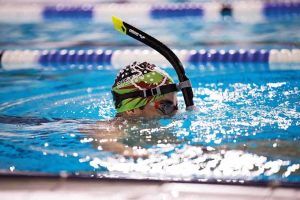
7 Best Swim Snorkels for Better Technique and Faster Swimming
Ready to throw down on a new swimmer’s snorkel? Here are reviews of the best swim snorkels for lap swimming.
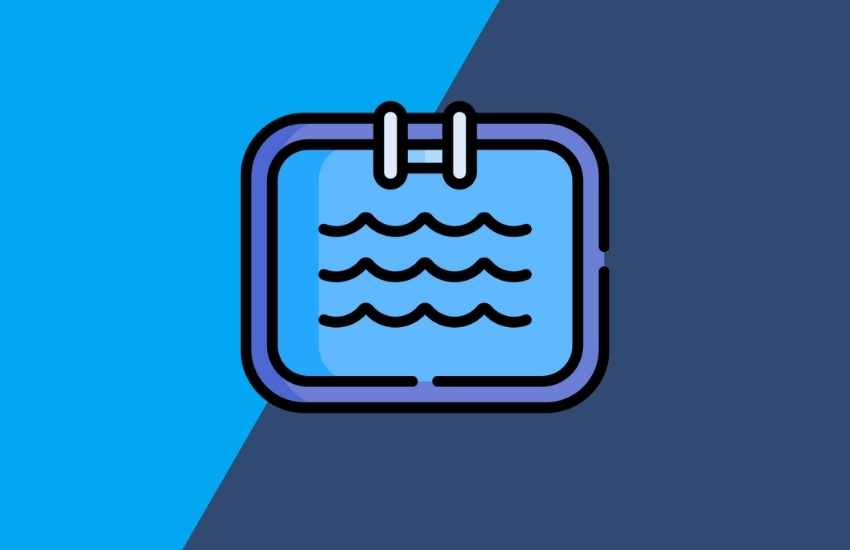
Get more from your swim pool by avoiding these costly mistakes when cleaning and maintaining your pool.
As a pool owner, you know that keeping your above-ground pool clean and clear can be quite a chore.
This becomes an even bigger task if you make some mistakes in the way that you go about trying to keep your swimming pool clean.
Some of these mistakes can end up creating headaches for you when it comes to keeping your pool water crystal clear and they can even end up being quite costly in terms of equipment and pool structure repairs.
This is why I thought it would be a great idea to write an article that goes over some of the common mistakes pool owners make when cleaning their swimming pools.
That way you can learn how to avoid them instead of dealing with the headaches and expense that results from making these mistakes yourself.
Let’s jump right in.
While your swimming pool water may look clean and clear, the balance of the chemicals inside of it is constantly changing.
That’s because as environmental factors impact your pool water (think acid rain, sunlight, suntan lotion) and bathers swim in it, the chemicals that you added to it will start to get used up. The warmer the temperature and the more people that swim in your pool, the less time that your added pool chemicals remain effective.
Frequent water testing (at least bi-weekly) helps you to avoid conditions where your swimming pool can quickly turn from being clear to being cloudy or green.
You also want to make sure to test your swimming pool’s water for more parameters than are found on typical pool test strips at least once a swim season. Preferably after you first open your swimming pool for the season. This will help you balance your pool water as perfectly as possible to begin with and make it easier to maintain throughout the season.
The best way to do this is to purchase a mail-in laboratory test kit or take a sample of your pool water to a local water testing company or pool supply store.
There are also some great digital pool test kits and the less-expensive options of pool test strips to give you an idea of where the pool chemistry is at.
One of the most neglected pieces of swimming pool cleaning equipment is pool brushes. I have talked to many pool owners who don’t even use them at all except when opening up their swimming pool for the season.
This is a big mistake that will cause you to have to put in more effort to keep your swimming pool clean.
What’s the reason for this?
Whether you own a fiberglass, concrete, or vinyl liner pool, the sides of it routinely become the resting place for algae, dirt, and other pool water contaminants. Just because you can’t see them does not mean they are not there.
Since pool circulation does not impact the cleanliness of the bottom of your pool and its sidewalls very much, brushing your pool walls and bottom regularly (bi-monthly) helps to keep them cleaner and improve the overall cleanliness of your swimming pool.
I would strongly recommend against using liquid chlorine and other alternative forms of chlorine (use only chlorine sticks and pucks) as your main pool sanitizer.
This is because this type of chlorine is usually only about 70% pure. That remaining 30% is inert ingredients will make it more difficult to keep your pool water clean and it does not contain stabilizers, so the chlorine in your pool water gets used up faster and needs to be added more often.
This is a practice that can also be devastating if you own an above-ground pool or an inground pool with a vinyl liner too. That’s because less pure forms of chlorine contain many inert ingredients.
These inert ingredients tend to form scale on the surface of vinyl liners that starts to dry them out and take their elasticity away.
Once a vinyl swimming pool liner loses its ability to stretch, it will often start to rip or tear near the top of the pool necessitating its replacement.
Have you ever added a bag of shock directly into your swimming pool after you noticed it getting a little cloudy?
You are not alone by any means if you have. That’s because this is a common but highly unrecommended practice of pool owners.
This can have severe consequences such as throwing your pool chemical balance out of whack, damaging your swimming pool, ruining pool equipment, and this can even cause harm to bathers that go into your pool water.
That’s why you should never add any chemicals to your swimming pool before reading the directions on the label as to how to best do it. This applies even to pool chemicals that you believe are fairly harmless including algaecides, soda ash, clarifiers, and more.
This is among the most common mistakes that pool owners make in an effort to keep their pools cleaner. While placing chlorine in a pool skimmer basket may seem like an easy way to get the chlorine into your pool that helps keep the water clean this can backfire on you too.
That’s because when the water is not circulating, the chlorine that’s in the skimmer will continue to dissolve and become a powerful chemical force that will weaken plastic skimmer parts and become highly corrosive when it reaches your pool pump and other water filtration equipment.
I have also witnessed occasions where skimmer tablets have floated out of skimmer baskets and ended up on the pool floor. This can discolor fiberglass and concrete pool bottoms and potentially ruin a vinyl pool liner.
So, place chlorine tablets and sticks in a properly installed chlorine feeder next to your pool filtration equipment. These are very inexpensive devices that work well and are simple to operate.
There is a reason your swimming pool installer or maintenance person tells you to keep your pool water at least halfway up your skimmer openings.
This is because that’s the level where your pool’s filtration system operates the most effective when it comes to circulating the water and skimming debris off of the top of it.
Any water level less than what’s recommended may let air into the system lessens the effectiveness of your pool’s circulation system and also overworks your pool pump and other equipment.
This is of the most concern when using your pool vacuum.
That’s because you lose a large amount of pool water when vacuuming on your filter’s waste setting or when you vacuum on the filter setting and then backwash your pool filter to clean it.
So regularly check and adjust your swimming pool’s water level especially after you vacuum it.
Here are a few of the most frequently asked questions that I get regarding pool cleaning mistakes:
I have an inground pool with a vinyl liner and no matter how many chemicals I add before closing it, the water is always very dirty when I go to open the pool back up. I was wondering if it’s OK to drain the water completely and just refill the pool to save water cleanup time?
This may not be a million-dollar question but it certainly is a several thousand-dollar question. That’s because draining an inground or above-ground pool with a vinyl liner completely to better clean it will most likely ruin that liner.
This will happen because over time, pool and environmental factors acting on a vinyl swimming pool liner will take away its ability to stretch (elasticity). You don’t notice this much when your pool is filled with water because your vinyl liner is constantly being kept moisturized by the water inside of your pool.
Once this pool water is removed, vinyl pool liners will often become very stiff and brittle to the point where they become rigid and unusable.
Is it OK to let my dogs swim in my pool to let them cool off on a hot summer day?
Do I feel that it’s OK to let your dog swim in your pool? As much as I think it’s cute to watch a dog swim around in a pool and have fun, this is something that you should definitely avoid.
That’s because it’s estimated that a single dog going into a swimming pool adds as much dirt and dander to a swimming pool as 50 bathers. So, just imagine what will happen to your pool water chemical balance if you let 2 or 3 dogs go into your pool.
Dogs swimming in backyard pools are also responsible for thousands of dollars of damage to backyard pools each swim season. This results from such occurrences as them tearing a vinyl liner with the nails on their paws or dog hair accumulating in pool pump baskets that has the potential to burn that pump up as it runs without circulating.
If I smell my pool water and it has a strong chlorine smell, does this mean that I don’t have to test its chlorine level?
Nothing could be further from the truth. You need to test your pool chlorine level at least twice a week to be sure that you have enough working chlorine inside of it.
You should also be aware that when your pool has a strong chlorine smell, this usually means that it has a large number of chloramines in it. This is the used-up form of chlorine that is no longer playing an active sanitizing role.
So, assuming that your pool has enough chlorine in it because of its smell may lead you to find your pool water cloudy or green when you next go to swim in it.
When I test my pool for chemicals after cleaning it, I only have to be concerned about its chlorine level right?
Although chlorine level is important because it keeps germs and bacteria at bay that are in your swimming pool water, it’s by no means the only important chemical level to be aware of. That’s why the best pool test strips will also test for pH, alkalinity, hardness, and cyanuric acid levels.
These other chemicals play an important role in keeping your pool water clear, keeping the water easy on your eyes & pool equipment, and keeping the chlorine that you put in your pool from being used up too quickly.
Keeping your swimming pool water safe and crystal clear does take some time each week but this should not be so involved that it takes away the enjoyment of having a swimming pool. When it does you are probably doing something wrong.
That’s why it’s so important that you learn to clean your swimming pool properly and then take steps to maintain it in-between cleanings.
I also recommend that you attend pool maintenance classes that are put on by your local swimming pool supplier or installer if you are a new pool owner and periodically take refresher courses too.
Also, if you have little time for swimming pool maintenance, you should consider having a professional pool service do your important pool maintenance tasks for you.
If you do these things and avoid the common pool cleaning mistakes that pool owners often make, your swimming pool will be much easier to maintain and you will enjoy it much more.
How to Winterize an Above-Ground Pool. Looking for some simple tips for winterizing your above-ground pool? Here’s an overview of when and how to prepare your pool for winter.
5 Best Heaters for Above Ground Swimming Pools. Want to get more time and use from your backyard pool? Here are our hand-picked selections of the best heaters for above-ground swimming pools.
6 Best Pool Ladders for Above Ground Swimming Pools. Looking for the right pool ladder for your above-ground pool? Here’s a breakdown of the best ones on the market, including key features, price, and more.

Olivier Poirier-Leroy Olivier Poirier-Leroy is the founder of YourSwimLog.com. He is an author, former national level swimmer, two-time Olympic Trials qualifier, and swim coach.
Olivier is the author of the books YourSwimBook and Conquer the Pool. He writes all things high-performance swimming and is passionate about helping swimmers, swim coaches, and swim parents master the pool.
His articles were read over 4 million times last year and his work has appeared on USA Swimming, SwimSwam, STACK, NBC Universal, and more.
He’s also kinda tall and can be found hitting noon-hour lap swims. You can learn more about Olivier here.

Ready to throw down on a new swimmer’s snorkel? Here are reviews of the best swim snorkels for lap swimming.
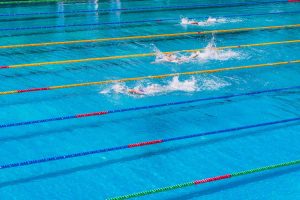
Looking to get some new swim gear on a budget? Shop the best Black Friday deals for swimmers in this exclusive guide.
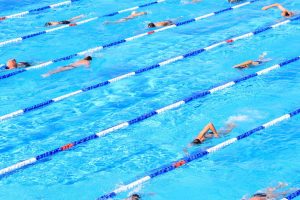
Looking for the best swimming app to maximize your time and effort in the water? Here’s a look at the top swim apps for conquering your swim workouts.
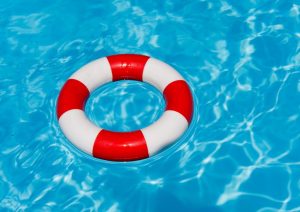
Wondering how often you should be testing the water in your pool or spa? Here’s a detailed look at how frequently you should test your pool. Your swimming pool and spa relies on being properly balanced to keep the water clean and safe for swimming. As a pool owner, you
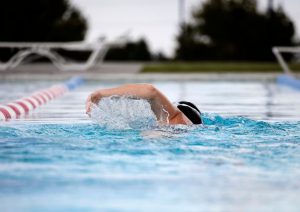
Fed up with the effects and smell of chlorine in your hair after swimming? Here is how to remove chlorine from your hair once and for all.
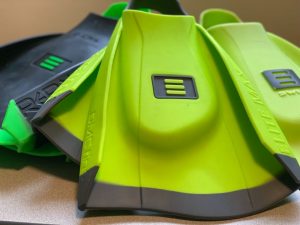
The DMC Elite fins are high-performance training fins for competitive swimmers. Here’s a review of why these fins are flat-out awesome.

LANE 6 PUBLISHING © 2012-2024 · PRIVACY POLICY · RETURN POLICY · TERMS OF SERVICE · AFFILIATE DISCLOSURE